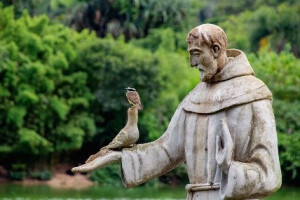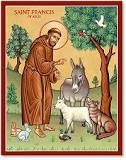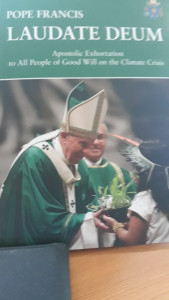 St Francis born in Assisi sometime between 1881/82, the son of a wealthy cloth merchant, left this material wealth to seek the wealth of the Lord. Taking the Gospel as his way of life, he worked for and lived with the poor. For me, his charisma is his ordinariness, his closeness and accessibility to the ordinary person, his commitment to peace and above all his love of creation in all its aspects.
St Francis born in Assisi sometime between 1881/82, the son of a wealthy cloth merchant, left this material wealth to seek the wealth of the Lord. Taking the Gospel as his way of life, he worked for and lived with the poor. For me, his charisma is his ordinariness, his closeness and accessibility to the ordinary person, his commitment to peace and above all his love of creation in all its aspects.
With his love for God’s creation, for the poor and outcasts he was deeply appreciated for his joy, his generous self-giving and openheartedness. He was “a mystic and a pilgrim who lived an integrated life, in simplicity, in harmony with God, with others, with nature, the world and its surrounding and with himself.” (Laudato Si’ 10)
Due to human action and inaction, the planet is warming. Severe droughts, wildfires, floods, and storms are wreaking havoc. Hundreds if not thousands of species are rapidly becoming extinct. The resulting damage disrupts the lives of ever more millions of people, among them those who become climate refugees and the poorest on our planet.
Let us quickly have a look at Francis – what he has to say, not merely with words – that is easy enough! – but by his way of life? Through his simple lifestyle his piety and deep spirituality, his love of God’s creation, he became a force of renewal that continues to bear fruit today. For St Francis, creation is cosmos. He sees everything created having its function and assigned place in our wonderful complex home, called Earth. This evokes awe and gratitude. It was because of this love for and understanding of the inhabitants of the universe, that John Paul 2, in 1979, proclaimed Francis patron Saint of Ecology and patron of those lovers of Ecology. An ecologist studies the relationship between living things and their habitats. St Francis had an innate instinct and interconnection in relation to all creation.
The linkage of St Francis with Ecology is well justified because of the respect and special relationship he had with nature and all creatures as a wonderful gift of God to the human race. Naming Francis as the patron of Ecology came at the end of the 1970’s, a time that witnessed the birth of the modern environmental movement, along with the celebration of Earth Day in USA. Earth Day, however, did not become a global event until 1990. By the end of the 1970’s US had an Environmental Protection Act. The years following had legislation to clean up rivers and lakes and to protect drinking water.
 Francis reminds us that we are all part of our environment with our call to live in an integrated way as we love and protect our common home. The Canticle of the Creatures, with its content and richness, composed towards the end of Francis’ life displays a contemplative gaze on earthly and heavenly creatures. He saw all reality pointing to God the Creator.
Francis reminds us that we are all part of our environment with our call to live in an integrated way as we love and protect our common home. The Canticle of the Creatures, with its content and richness, composed towards the end of Francis’ life displays a contemplative gaze on earthly and heavenly creatures. He saw all reality pointing to God the Creator.
Francis not only offers up praise to God with ‘Sir Brother Sun’ ,‘Sister Moon and Stars’ and ‘Sister Water’, but invites all creatures to join him in praising God.
Most High, all-powerful, good Lord,
Yours are the praises, the glory, and the honour, and all blessing,
To You alone, Most High, do they belong, and no human is worthy to mention Your name.
Praised be You, my Lord, with all Your creatures.
Praised be You, my Lord, with all Your creatures, especially Sir Brother Sun, who is the day.
and through whom You give us light. And he is beautiful and radiant with great splendor;
and bears a likeness of You, Most High One.
Praised be You, my Lord, through Sister Moon and the stars, in heaven.
You formed them clear and precious and beautiful.
Praised be You, my Lord, through Brother Wind, and through the air, cloudy and serene,
and every kind of weather, through whom You give sustenance to Your creatures.
Praised be You, my Lord, through Sister Water, who is very useful and humble and precious.
Praised be You, my Lord, through Brother Fire, through whom You light the night, and he is
Beautiful and playful and robust and strong.
Praised be You, my Lord, through our Sister Mother Earth, who sustains and governs us, and who
produces various fruit with colored flowers and herbs.
Praised be You, my Lord through those who give pardon for Your love, and bear infirmity and tribulation.
Blessed are those who endure in peace for by You, Most High, shall they be crowned.
Praised be You, my Lord, through our Sister Bodily Death, from whom no one living can escape.
Woe to those who die in mortal sin. Blessed are those whom death will find in Your most holy will,
For the second death shall do them no harm.
Praise and bless my Lord and give you thanks and serve you with great humility.
For me, this Canticle isn’t just a hymn of praise, it reflects how Francis encountered God in all things. Franciscan Theologian Sr Ilia Delio writes; “The canticle discloses Francis’ view of nature as a sacramental expression of God’s generous love. This love binds us together in a family of relationships; ‘brother’ ‘sister’. Francis came to understand the incarnation as sanctifying all creation”.
We can only marvel at the legacy Francis left us. The fundamental relationship between Incarnation and creation leads to the idea that each and every aspect of creation has absolute dignity because everything is created specifically and uniquely through the Word of God. Aware that the only creator is God, led St Francis to challenge the rationale of power and property which sees people as controllers of everything, instead of beneficiaries of a free gift from God given equally to all. The power to dominate is given by God. It is not our own.
Pope Francis challenges the misinterpretation of Judeo-Christian thinking in Genesis 1:28, when he speaks of humans with ‘dominion’ over the earth. To quote Laudato Si’, “nowadays we must forcefully reject the notion that our being created in God’s image and given dominion over the earth justifies absolute domination over other creatures.” (67)
Elizabeth Johnson in her article “What does it mean to believe in an Ecological God” writes ; ‘The landscape of our imagination expands when we realize that human connection to nature is so deep that we can no longer define our identity without including the great sweep of cosmic history and our shared genetic inheritance with other organisms in the evolutionary history of life. There is but one community of life on Earth. Everything is connected to everything else, and we all flourish and wither together’.
Today, all of us are still learning to recognize and value our interconnectedness with the natural world and we try to convince ourselves that any exploitation of nature contributes to the current ecological crisis. Our planet is in pearl and “cries out to us because of the harm we have inflicted on her by our irresponsible use and abuse of the goods which God has endowed her. We have come to see ourselves as lords and masters entitled to plunder her at will. (Laudato Si’ 2)
Strong and challenging words from Pope Francis!
It is somewhat surprising to find that one third of people consulted in 27 countries throughout Asia, Europe and America, who responded to the Global Conference study earlier this year, are not worried about climate change and the world crisis, with its devastating impact on the poorest and most vulnerable, who make up the majority of earths inhabitants. We are challenged to ask.
HOW LONG MORE CAN WE CONTINUE TO BURY OUR HEADS IN THE SAND??
Why this compliancy?
- Do we see actions to alleviate change as somehow reducing our standard of living?
- Do we think that saving the planet from boiling and becoming uninhabitable for billions of people is the job of the next generation?
The longer we postpone the nearer the irreversible tipping point will be.
Our times urgently require that we humans develop an ecological sense of ourselves in tune with belief in an ecological God. In light of our common creator, it is essential to expand our sense of identity to include relationships with other creatures, the land, water and air and with all creation itself.
Once we have truly appreciated the life of “the other,” we arrive at a new starting point for decision-making. Then we can begin to change some of the deep-seated behaviours that are driving environmental destruction as well as our world’s galloping poverty, the deity of the market and our cultural despair. Humbled and delighted by the life around us, we can begin to hear the cry of the Earth and the cry of the poor and step up to protect our Common Home. (Elizabeth Johnson)
Where do we RNDM’s stand in relation to the global crisis?
Can the life of St Francis speak to us today in the midst of our global crisis?
“Empowered by the Spirit, we are sent as disciples of Jesus to share our lives in the service of love, seeking the fullness of life for the whole of creation” (Constitutions 4)
What do you see as a challenge for – me/you? – For RNDM’s?
Reflection shared with the Common Home Commission on 4th October 2023.
Liz Hartigan RNDM
 “The reflection and information that we can gather from these eight past years allow us to clarify and complete what we were able to start some time ago”. (Pope Francis – Laudate Deum 4)
“The reflection and information that we can gather from these eight past years allow us to clarify and complete what we were able to start some time ago”. (Pope Francis – Laudate Deum 4)